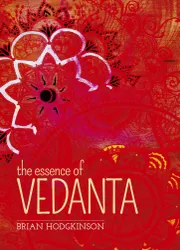All students of philosophy will relate to the concepts of selfhood, nature, karma and liberation. Here are views and answers to the most important questions. How is self identified? What are the causes and effects in nature? Are our actions determined? What is freedom for a human being? What happens after death?
The Essence of Vedanta examines issues of existential philosophy from the viewpoint of the Veda, the most ancient and sacred of Indian scriptures, and also outlines the work of Sankara, the early medieval master of Vedanta's dominant form, Advaita. The foundation of all Vedic teaching lies in the universal truth that human nature reflects God (Brahman), who exists in every living thing. An individual needs no salvation therefore, because he or she is never lost, but merely living in ignorance of his or her true nature. Brian Hodgkinson offers readers insight into, and discussion of, the fundamental questions of the Vedic system concerning self-realization, such as knowledge versus ignorance, the self, consciousness, free will, nature, time, the mind, language, law and society. His fascinating appraisal reveals the profound nature of the Veda and its practices. With its tolerance of other faiths, and ultimately uplifting spiritual message, it is a discipline that chimes with our 21st century needs and preoccupations.





